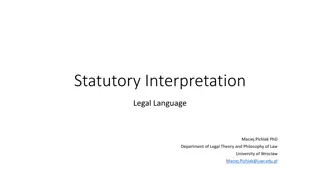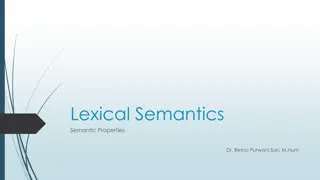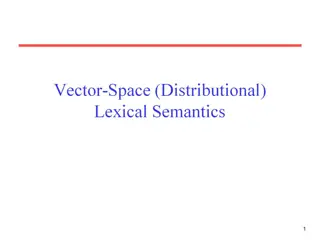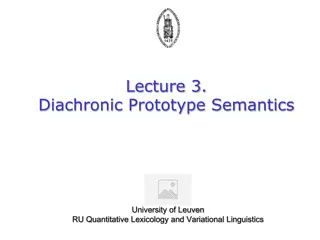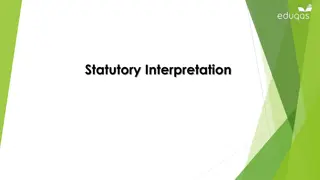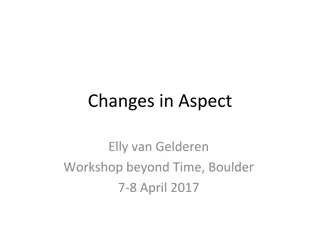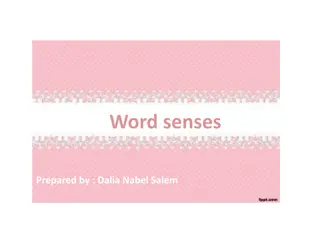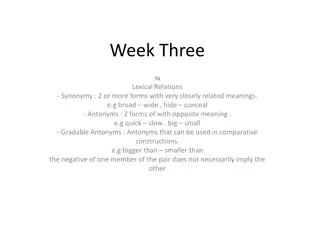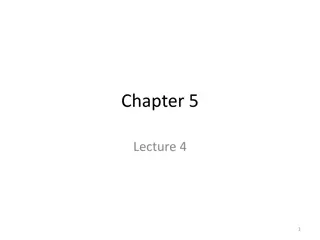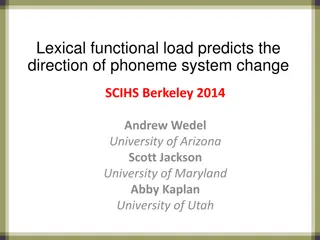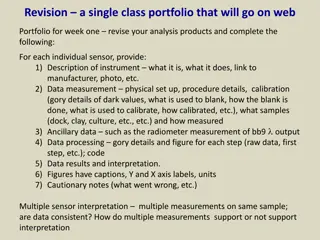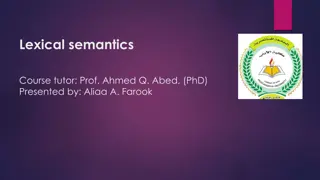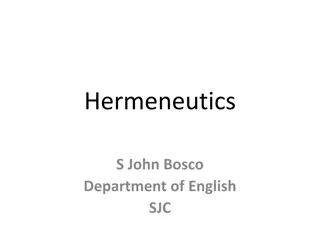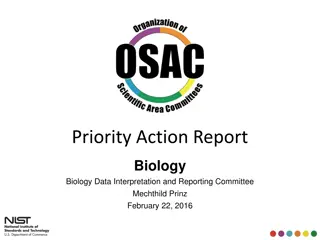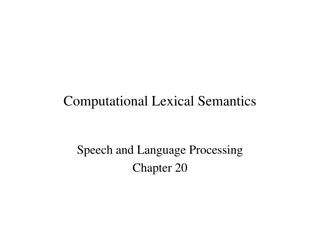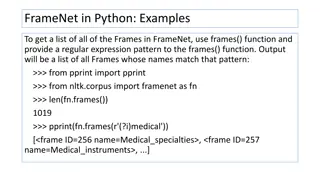Lexical Aspects of Interpretation: Focuses of Meaning
This discussion explores the concept of "focuses of meaning" in interpretation, emphasizing how interpreters memorize and reconstruct oral messages around key elements such as subject field terms, set phrases, and precision lexicon. The necessity of understanding terminology in various subject fields is also highlighted, as different sectors may assign distinct meanings to the same lexical items.
Download Presentation

Please find below an Image/Link to download the presentation.
The content on the website is provided AS IS for your information and personal use only. It may not be sold, licensed, or shared on other websites without obtaining consent from the author.If you encounter any issues during the download, it is possible that the publisher has removed the file from their server.
You are allowed to download the files provided on this website for personal or commercial use, subject to the condition that they are used lawfully. All files are the property of their respective owners.
The content on the website is provided AS IS for your information and personal use only. It may not be sold, licensed, or shared on other websites without obtaining consent from the author.
E N D
Presentation Transcript
Lecture 10 LEXICAL ASPECTS OF INTERPRETATION
The Notion of the "Focus of Meaning" There exist many approaches to identifying the notion "translation units , which are called "chunks of speech , subject to interpreting / translating, however most authors: L.Barkhudarov, R. Jones, Y. Retsker, Y. Stepanov, J.P. Vinay, J. Darbelnet believe that any unit of speech (i.e. phonemes, morphemes, words, sentences, paragraphs and texts) may be subject to interpretation and translation. word combinations,
V. Koptilov even suggests a special term the translation unit "translateme", which is defined 'as an "atom of sense" that cannot be split up without ruining the sense'. Selection of translation determined by the interpretation/translation is performed, by the subject field of the SL text and by the level of professional skills of the interpreter/translator. for the so-called units in is conditions which
It is obvious that interpreters, while interpreting, memorize the SL text by the so- called "focuses of meaning". Experiments show that human brain is capable of keeping in memory 7 +/- 2 focuses of meaning, therefore, interpreter's note- taking is a useful interpreters to "reconstruct" oral messages for their subsequent interpreting. tool which enables
Focuses of meaning are formed around "keywords" of oral include, first of all, specific subject field words, i.e. terms belonging to the subject field of interpreting. Among other focus-forming elements of oral discourse there are set phrases (clich s) and idioms; numerals, abbreviations, acronyms "precision lexicon"); non-equivalent lexical items and "misleading words". the discourse, which proper (the names, so-called
Subject Field Terms: Ways of Interpreting Them
Terms are usually defined as monosemantic words, deprived of any expressive meaning, or even as a special quality, which words may acquire or lose in discourse. These days the problem of understanding and interpreting terminology has to be addressed in somewhat new dimension. The reason for this is that many lexical items acquire different terminological meanings in the context of different sectors or subject fields of human activity.
Examples: yield (potentially open set of terminological meanings depending upon the subject field): (securities markets); (industry); (extraction of natural resources); (processing industry); , (mining); (military sphere) and the like.
Another reason is a considerable level of "jargonization" of professional which results in a high proportion of idiomatic use and polysemy in terminology: bear and bull markets; bottlenecks; high-fliers; "muddle-through" scenario; to sit on the Board; benchmark (or yardstick), etc. languages,
Roughly subject field words of any language may be classified into three groups: 1. General subject field words (known to most educated speakers of the language), e.g. computer ( ' ); printer ( ); accountant ( ); assets ( , , ); creditor ( ); indicator ( ); investor ( ); civil servant ); (
2. Special subject field words (known to all people who work in a particular sector, such as computer science, banking, accounting, stock-markets, civil service, agriculture, engineering, chemistry, physics, medicine, law, education, etc.)
Examples: payable accounts accounts ); ( ); economy of scale ( ); fiduciary ( ); party whip ( - , ). ( receivable
3. Professional jargon and slang (words known to comparatively narrow groups of professionals, often working for particular institutions or companies), e.g. bear market ( - , ); bull market ( - , ); "muddle through" scenario -
It is obvious that there are no "closed borders" between these means that words constantly "migrate" from one group to another, the usual direction of migration being from group 3 via group 2 to group 1, and that new words are coined within each sector practically every day. groups which
This process is accelerated by the revolution in information technologies practically impossible to record all newly created words even dictionaries are at least one or two years behind. Hence, the following recommendations for interpreters and translators can be made: which makes it best specialized
1) The interpreter has to keep maximum number of the subject field words relevant for the subject of interpreting in his "operational memory", constantly keep records of the new personal glossaries and request glossaries (especially of the professional jargon) from the client. terms, compile
2. As a first step, before deciding to render a term, an interpreter has to make himself sure that he deals with a subject field word and not with a word or phrase in its usual meaning e.g.: to sit on the Board +
This is achieved by studying the context and the objects, notions, situations, processes (i.e. the denotatum) of the translation with due polysemy and connotation meaning of the subject field word or phrase. subject regard field possible of to
The second step is to select an appropriate variant of translation from various options recorded in dictionaries e.g. expenditures ; insurance ; subsidy , ; etc.
Or, if the word is not recorded, use one of the following generally accepted methods of translating/interpreting it (examples below are given for the terms recorded in the dictionaries):
practical transcription, e.g. file - (computers); futures - ' (finance); manager - ; know-how - - (science and technology); transliteration, e.g. broker - (securities markets); clearing - (finance); hacker - (computers); barter - (commerce);
loan translation (-), e.g. player - , " , (economics); floating zero self-cooling ore yard "
descriptive translation, e.g. benchmark (or yardstick) - , (economics); enforcement - (law, politics); sustainable development ( ) environmental protection, politics). - (economics,
In interpreting, decision to render something has to be taken within seconds and its success largely depends upon the capacity of the "operational memory" Selection of the interpretation method depends upon the existence or absence of the objects, notions, situations, processes described by the given subject field word or phrase in the SL and TL cultures. of the interpreter. (denotatum)
If the denotatum exists in the TL culture, then there is a great chance to find a "native" equivalent of the corresponding subject field word or phrase e.g.: account - ; arrears - , ; insurance - ; hostage - ; spokesman - .
If the denotatum was borrowed from other cultures or presently does not exist in the TL culture, then practical transliteration, loan or descriptive translation are applied e.g. dividends - ; holding - ( , ); interoperability ( ); transcription, -
However, whatever traditional or electronic dictionaries, as well as computer translation software (computer-assisted systems CAT) may be available, the best way for a interpreter/translator to cope with terminology is to keep personal records, then compile them into glossaries and, thus, improve personal skills. translation
See you next time! Have a nice day!







